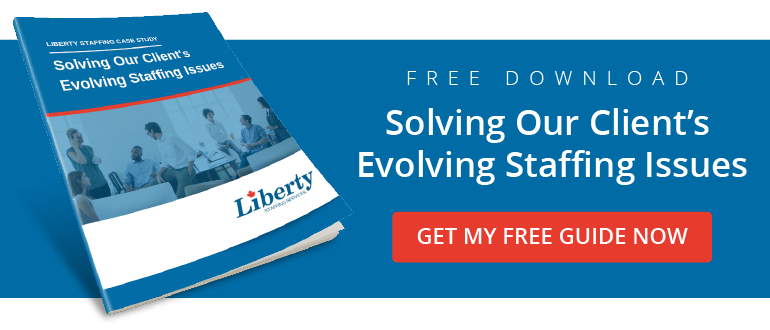 Almost every industry has been affected by product shortages over the last few years. These shortages can cause anything from a minor inconvenience to a complete operational shutdown.
Almost every industry has been affected by product shortages over the last few years. These shortages can cause anything from a minor inconvenience to a complete operational shutdown.
The manufacturing industry has been hit hard by these supply chain disruptions. If you are understaffed due to the challenging reality of running a manufacturing facility during these shortages, you are not alone.
Liberty Staffing can help you find great workers to keep things running smoothly. Reach out to us today to learn more.
Every Industry has Been Affected, Including Manufacturing
The pandemic has affected supply chains around the globe. It’s not just Canada, and it’s not just manufacturing.
Shortages have been caused by economic slowdowns, COVID-19 breakouts, people leaving the workforce (either by choice or because of getting sick), and major changes in consumer behaviours.
Additionally, raw material shortages, shipping delays, bottlenecks at ports, and staffing shortages at trucking companies have all played a part in getting us to where we are now.
Some Products are More Likely to be Delayed than Others
According to supply chain experts, some supplies are especially likely to be delayed in 2022.
For example, semiconductors, aluminium, plastics, many food products, and building materials are some of the most likely delayed products.
This list is relevant to manufacturers who are trying to maintain production schedules. When you’re unable to acquire the basic supplies you need to fulfill your quotas, you can end up with costly interruptions to your business operations.
Manufacturers are Seeing Higher Operational Costs
A recent survey revealed that 9 out of 10 Canadian manufacturers are experiencing higher costs and delayed operations due to supply shortages.
Even though there is plenty of demand for products across almost all industries, manufacturers just can’t keep up with the demand.
When manufacturers are successful in their attempts to maintain production levels, they often have to find costly workarounds or alternative suppliers. Unfortunately, these costs usually need to be passed onto retailers and consumers, which means manufacturers have less flexibility to appeal to budget-conscious consumers.
Business Continuity is a Problem
Manufacturers succeed when they can consistently fulfill their promises and maintain the continuity of their processes.
When manufacturers can’t get the supplies they need, that can create operational chaos. In these scenarios, not only are products delayed, but machinery can’t be repaired or serviced, and completed products can’t be shipped out in a timely manner.
Business Relationships are Strained
All businesses are based on relationships, and those relationships are strained. On one side of operations, manufacturers find themselves anxiously negotiating with suppliers to try to get their supplies. On the other hand, retailers and buyers are frustrated by manufacturers who can’t meet their orders.
When a buyer expects a product by a certain date, they can get pretty frustrated–especially if they don’t understand the reason for the delays.
Today’s warehouse managers spend a lot of time negotiating complicated interactions between vendors.
Manufacturers Have to be Nimble When it Comes to Staffing
The ups and downs of pandemic-era manufacturing require companies to be flexible when it comes to staffing.
When things are delayed and operations slow down, you likely want fewer people working in your facility. However, you want to be able to scale up quickly when things improve, which means having access to workers who are ready to get back on the manufacturing floor.
One way that manufacturing industry businesses have adapted to these changes is to work with a staffing agency. Staffing agencies can help you find temporary and permanent workers, as well as part time and full time employees.
Liberty Staffing knows how to quickly and effectively attract and onboard new workers for the manufacturing industry. We’ve been working with manufacturers throughout Southern Ontario for over 20 years.
Don’t let changes in product delays ruin your ability to staff your manufacturing facility effectively. Help is available! Contact Liberty Staffing today to find out how to build the best team possible during all of the ups and downs of manufacturing industry trends.

